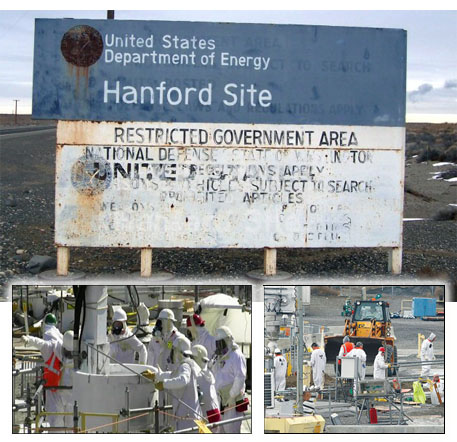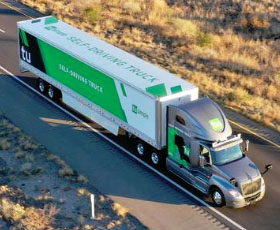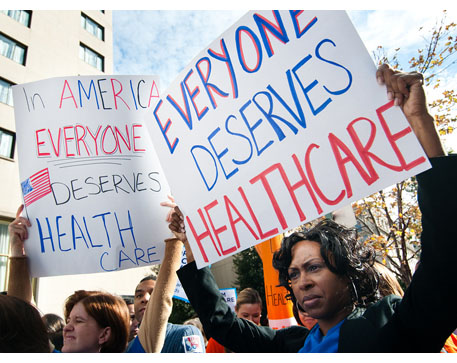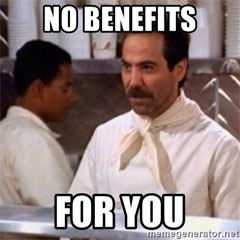NEWS ROUNDUP
Setbacks at Hanford ● It’s about health care ● Benefits of a union
Tuesday, May 21, 2019
LOCAL
 ► In today’s Seattle Times — Unexpected contamination reported in Hanford cleanup — A difficult cleanup of a Hanford research laboratory near Richland and the Columbia River suffered setbacks this spring as some contamination was not the type expected, spread farther than anticipated and was found on a worker’s personal clothing, according to incident reports published by the Defense Nuclear Facilities Safety Board.
► In today’s Seattle Times — Unexpected contamination reported in Hanford cleanup — A difficult cleanup of a Hanford research laboratory near Richland and the Columbia River suffered setbacks this spring as some contamination was not the type expected, spread farther than anticipated and was found on a worker’s personal clothing, according to incident reports published by the Defense Nuclear Facilities Safety Board.
► In the (Everett) Herald — Aerospace program helped Tulalip teen break out of his shell — Gio Bryan wants to work at Boeing. First, he’s graduating from an alternative high school in Tulalip.
BOEING
► Today from The Guardian — Boeing dismissed chance of ‘bird strike’ that may have caused second 737 Max crash — Boeing officials, shortly after the first fatal crash of its 737 Max jet, played down the likelihood that a bird strike could impair the plane’s sensor equipment. Now investigators are exploring whether such a situation led to a second deadly accident just five months later. According to the Wall Street Journal, U.S. aviation authorities believe a bird collision may have set off the sequence of events that led to the downing of an Ethiopian Airlines 737 Max in March, in which 157 people died.
► In today’s Seattle Times — Kirkland consultant questioned for six hours in criminal probe of Boeing 737 MAX crashes — While Boeing’s push to lift the grounding of the 737 MAX is making headlines, federal prosecutors have been quietly gathering information to determine if criminal conduct contributed to two deadly crashes of the troubled jetliner.
► From Reuters — French woman sues Boeing seeking at least $276M over Ethiopian crash — A French woman whose husband was killed in the March crash of a Boeing 737 MAX airliner in Ethiopia has filed a U.S. lawsuit against the planemaker seeking at least $276 million in damages, her lawyer said on Tuesday.
THIS WASHINGTON
► In the (Everett) Herald — Drug price information should help control costs (editorial) — What the market force of price transparency — not just on drugs but on health care procedures and hospital services, too — can provide is fair pressure on the providers to keep drug prices reasonable and accessible.
THAT WASHINGTON
► From The Hill — GOP presses Trump to make a deal on spending — McConnell and McCarthy are eager to strike a deal to avoid the prospect of another government shutdown, even if it means giving Democrats an increase in domestic nondefense spending, which most Republicans would otherwise oppose.
 ► From Reuters — Self-driving trucks begin mail delivery test for U.S. Postal Service — The USPS on Tuesday started a two-week test transporting mail across three Southwestern states using self-driving trucks, a step forward in the effort to commercialize autonomous vehicle technology for hauling freight. San Diego-based startup TuSimple said its self-driving trucks will begin hauling mail between USPS facilities in Phoenix and Dallas to see how the nascent technology might improve delivery times and costs. A “safety driver” will sit behind the wheel to intervene if necessary and an engineer will ride in the passenger seat.
► From Reuters — Self-driving trucks begin mail delivery test for U.S. Postal Service — The USPS on Tuesday started a two-week test transporting mail across three Southwestern states using self-driving trucks, a step forward in the effort to commercialize autonomous vehicle technology for hauling freight. San Diego-based startup TuSimple said its self-driving trucks will begin hauling mail between USPS facilities in Phoenix and Dallas to see how the nascent technology might improve delivery times and costs. A “safety driver” will sit behind the wheel to intervene if necessary and an engineer will ride in the passenger seat.
► From Bloomberg — Supreme Court rejects UPS efforts to force Postal Service to raise delivery prices — The justices left intact an appeals court decision upholding the government’s method for determining how much the Postal Service can charge for parcels. The rebuff is a victory for online retailer Amazon, which relies on the Postal Service for deliveries and backed it in the court case.
► From Bloomberg — DOJ leans against approving T-Mobile’s takeover of Sprint — The Justice Department is leaning against approving T-Mobile’s proposed takeover of Sprint, according to a person familiar with the review, even after the companies won the backing of the FCC chairman.
► In today’s Washington Post — Judge rules against Trump in fight over president’s financial records — Trump on Monday lost an early round of his court fight with Democrats after a federal judge ruled the president’s accounting firm must turn over his financial records to Congress as lawmakers seek to assert their oversight authority.
EDITOR’S NOTE — If Trump appeals, the chief judge of the court is… Merrick Garland.
NATIONAL
 ► From The Hill — Health care tops list of Americans’ top issues in new poll — Forty-five percent of Democrats, 30 percent of Republicans and 31 percent of independents chose health care as their top issue from six options, including the economy, education, environment, foreign policy and immigration. Sixty-two percent of respondents ranked health care as either their top or number two issue.
► From The Hill — Health care tops list of Americans’ top issues in new poll — Forty-five percent of Democrats, 30 percent of Republicans and 31 percent of independents chose health care as their top issue from six options, including the economy, education, environment, foreign policy and immigration. Sixty-two percent of respondents ranked health care as either their top or number two issue.
► In today’s NY Times — Why workers without college degrees are fleeing big cities — For the first time in at least a decade, 4,868 more people left King County, Wash. — Amazon’s home — than arrived from elsewhere in the country. The trend is becoming widespread. This growing flow of people out of the hotbeds of innovation and economic activity underscores how lopsided the distribution of opportunity has become. In King County, the median family income is $105,512, way above the national median of $76,000. The problem is that workers without a four-year college degree don’t earn anywhere near that much.
► In today’s NY Times — Video game developers power up a high-stakes unionizing campaign — Union leaders and grassroots organizers are looking to tap into the dissatisfaction that some game workers are feeling by unionizing the industry. It could be a transformative fight for organized labor, propelling unions into a tech-heavy space and delivering new members to declining rosters.
 ► Today from The Guardian — 1.6M Americans live near the most polluting incinerators in the U.S. — Lower-income and minority communities are exposed to majority of the pollution coming from waste-burning plants, a new report finds.
► Today from The Guardian — 1.6M Americans live near the most polluting incinerators in the U.S. — Lower-income and minority communities are exposed to majority of the pollution coming from waste-burning plants, a new report finds.
► In today’s NY Times — ‘Flint is everywhere’: California farmworkers confront a tainted water crisis — Water is a currency in California, and the low-income farmworkers who pick the Central Valley’s crops know it better than anyone. They labor in the region’s endless orchards, made possible by sophisticated irrigation systems, but at home their faucets spew toxic water tainted by arsenic and fertilizer chemicals.
► In today’s Washington Post — Johns Hopkins Hospital sues patients, many low income, for medical debt — Johns Hopkins Hospital has filed more than 2,400 lawsuits in Maryland courts since 2009 against patients with unpaid bills, including a large number of residents from distressed neighborhoods surrounding the East Baltimore medical campus.
► In today’s Wall St. Journal — ‘Playing catch-up in the game of life.’ Millennials approach middle age in crisis — American millennials are approaching middle age in worse financial shape than every living generation ahead of them, lagging behind baby boomers and Generation X despite a decade of economic growth and falling unemployment.
TODAY’S MUST-READ
 ► In today’s NY Times — The economy is strong. So why do so many Americans still feel at risk? (by Jacob Hacker) — Recent polls suggest a substantial majority of Americans feel the economy is working only for “those in power.” A big reason for this disconnect is that many Americans feel insecure… The basic problem is that most of the jobs offered today don’t provide the guarantees that workers once expected… The United States spends more on social benefits than any affluent country besides France once you take into account tax breaks and employer-sponsored benefits. But there is a big difference: We have a system that is premised on employers providing many of the benefits that governments elsewhere provide directly… In the mid-20th century, American corporations came to be seen as mini-welfare states, providing workers not only with job security and continuous training but also with generous health benefits and a secure retirement income. That world is gone, and it’s not coming back. In short, the implicit social contract that once bound employers, families and government has unraveled, and nothing has taken its place.
► In today’s NY Times — The economy is strong. So why do so many Americans still feel at risk? (by Jacob Hacker) — Recent polls suggest a substantial majority of Americans feel the economy is working only for “those in power.” A big reason for this disconnect is that many Americans feel insecure… The basic problem is that most of the jobs offered today don’t provide the guarantees that workers once expected… The United States spends more on social benefits than any affluent country besides France once you take into account tax breaks and employer-sponsored benefits. But there is a big difference: We have a system that is premised on employers providing many of the benefits that governments elsewhere provide directly… In the mid-20th century, American corporations came to be seen as mini-welfare states, providing workers not only with job security and continuous training but also with generous health benefits and a secure retirement income. That world is gone, and it’s not coming back. In short, the implicit social contract that once bound employers, families and government has unraveled, and nothing has taken its place.
 EDITOR’S NOTE — Want to earn better benefits? Get a union! Get more information about how you can join together with co-workers and negotiate a fair return for your hard work. Or go ahead and contact a union organizer today!
EDITOR’S NOTE — Want to earn better benefits? Get a union! Get more information about how you can join together with co-workers and negotiate a fair return for your hard work. Or go ahead and contact a union organizer today!
The Stand posts links to Washington state and national news of interest every weekday morning by 10 a.m.





